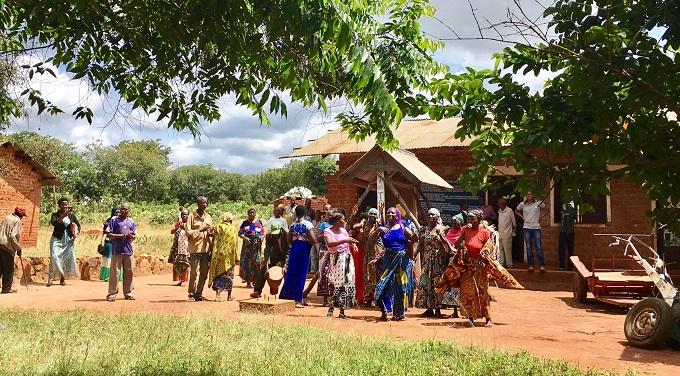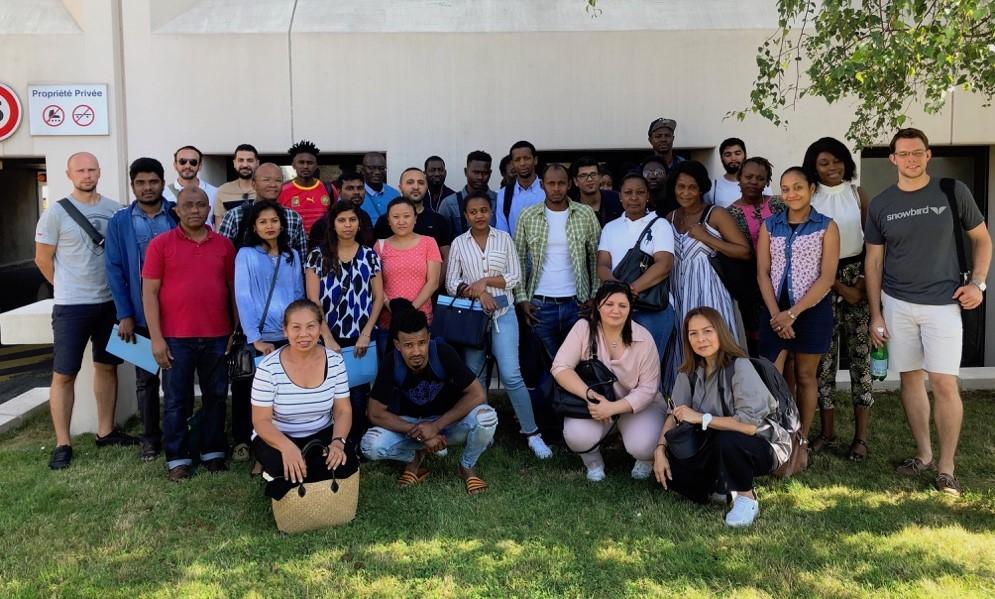
© Members of the Compact for Young People in Humanitarian Action
The project in brief
Implemented by
The Compact for Young People in Humanitarian Action and its members, including but not limited to, ICRC, RET, NRC, UNFPA, UNICEF and MYAN.
Country
Global
Duration
May 2016 - until the objectives and core actions of the CYPHA will be completed
Description
The Compact for Young People in Humanitarian Action (CYPHA) is an initiative contributing to strengthening the humanitarian and development nexus, by convening efforts, expertise and voices from both sectors to seek for reliable solutions to the concerns, needs and expectations of youth affected by crisis. In this regard, through its 5 core Actions, the CYPHA aims at supporting its members and any other actor working with and for young people in crisis settings to ensure that the priorities of young people are addressed. It aims to help organisations ensure that young people are informed, consulted and meaningfully engaged through all stages of humanitarian action.
The CYPHA contributes to facilitate more equitable, sustainable and predictable solutions to the diverse realities faced by refugee adolescents and youth around the world.
Under the umbrella of the Compact, several promising initiatives have taken shape which together are advancing the work of making the humanitarian system more inclusive of young people and advocating for meaningful participation of young refugees. An example is that CYPHA as part of its core action 1 (service delivery) is developing an inter-agency guideline to assist members to programme with and for young people. The aim is to build on the potential of young people and lay the foundation for adolescents and youth to contribute positively to their communities in the long term. As part of Action 3 (capacity building) members are developing local capacity building platforms to catalyse support for local youth-led initiatives in humanitarian settings. This serves as a mechanism to empower and engage local youth groups in humanitarian action. As part of Action 5 (data), the membership is identifying and recommending harmonised data collection methods and developing a common approach to ensuring data collection is sex- and -age disaggregated.
Together, these initiatives are very well aligned to the GCR's programme of action with regards to refugee and adolescent and youth needs and concerns.
Project aims
Operationalise the CYPHA at national level. The CYPHA is unique in that there is no other structure that exists for coordinating and driving youth policy and programming on the ground. With a focus on building the capacity of organisations and local partners to ensure that the needs and rights of young people are met, the work at global, regional and national levels is complementary to the work of the Global Youth Advisory Council.
Resources used
- Workshops
- Time of human resources in various agencies
Main activities of the Good Practice
At global level the CYPHA sets the strategic direction around 5 core actions: service delivery; participation; capacity and local action; resources and data and knowledge for countries to implement. This includes guidance, tips, templates, check lists and webinars that encourage both inter-sectoral, but also multi-stakeholder coordination across organisations. Compact members at country level in Jordan have identified key gaps for ensuring youth-focused programming across various sectors and see the CYPHA work as an excellent entry point to improve advocacy for and coordination of youth responses. Using the power of having regular monthly meetings at global level, the CYPHA colleagues at national level in Jordan issued a call to action to all members working in Jordan to join in discussions on how to operationalise the CYPHA at national level. Part of this effort they have begun mobilising a group of existing CYPHA members who have representatives in Jordan in order to collaboratively decide how to proceed in a way that is relevant and sustainable.
The teams have conducted meetings with inter-sector working groups in Jordan to present the CYPHA and discuss ways to go about localisation of the work on the ground, including a wide range of local stakeholders in discussions. The project aims to develop collectively an agreement on which of the 5 areas to be in focus in a very action-orientated manner with clear objectives. They aim to meet on a regular basis for all interested agencies, using CYPHA as a platform to create a space to work on youth-specific issues across the 5 areas of focus, across multiple sectors and a wide range of diverse stakeholders.
The national-level initiatives provide excellent learning at both national and global level. It ensures that CYPHA initiatives do not remain at global level discussions and it supports CYPHA’s aim to stay nimble and relevant; identifying where gaps exist at country level and being service providers for teams on the ground.
VIDEO: Compact For Youth in Humanitarian Actions (United Nations)
Partners
ActionAid, Alef, Association Aljil, Anti-tribalism movement, Arche-Nova, Barranquilla +20, Crown Agents, CAYC, Ministry of Foreign Affairs Denmark, DRC, Finn Church Aid, Gooddler, GenCap, German Humanitarian Assistance, Boston University – Global Development Community, Global Platform for Syrian Students, IFMSA, IFRC, Youth Assembly, Instambul, IMCS-MIEC, IRC, Mercy Corps, NRC, MYAN, Plan International, Reach Out to Asia, RET International, Right to Play, Restless Development, Save Youth Future Society, Scouts, Terre des Hommes International, SDSN-Youth, The Humanitarian Forum, UK-Aid, Benetton, Secretary General’s Envoy on Youth, UNDP, UNIDO, UNFPA, UNHCR, UNHABITAT, UNICEF, UN Peace Building, UN-Women, UN-Volunteers, UN Major Group for Children and Youth, UNOY, United Muslim Relief, RBK, WRC, WFP, [email protected]
Challenges and how they were overcome
Challenges
Ensuring that the coordination structure does not overlap with existing structures and is inclusive of existing structures and local partners.
How they were overcome
Ensuring open communication across already existing coordination structures. This means ensuring that awareness raising workshops and meetings are continuously ongoing with various partners including local partners and authorities.
Results of the Good Practice
- Understanding of the positive role young people play in addressing the concerns affecting them in crisis affected contexts, including situations of forced displacement and refugee protection
- Engagement 53 institutional members, including governments, UN entities, international and local NGOs, private sector, youth organisations and networks
- Development of a Desk Review on programmatic guidelines and thereafter inter-agency guidelines for adolescents and youth in emergencies across multiple sectors. Aligned to the core actions for refugee youth
- Localisation of CYPHA in Jordan
- Local capacity building platforms to support local youth-led initiatives and engage local youth groups in humanitarian action
Next steps
To identify opportunities to further advance the localisation work in Jordan with key local partners. Ensure that the learning from localisation at national level feeds back into global CYPHA work in order for the team to stay relevant and field orientated.



